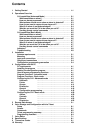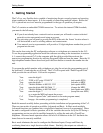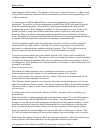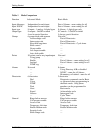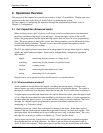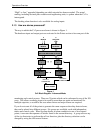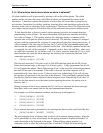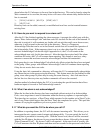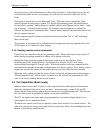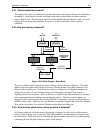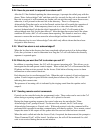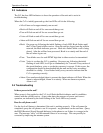
Operations Overview 2-1
B1272M001
BARNETT ENGINEERING LTD. ProTalk Cv2
2. Operations Overview
The purpose of this chapter is to provide an overview of the Cv2 capabilities. Chapter topics are
organized in the same order that you would follow in setting up the system.
For more details on configuring the operation through the programming software, refer to
Chapter 3, Configuration.
2.1 Cv2 Capabilities (Advanced mode)
When an alarm occurs, the Cv2 places a call using its built-in cellular phone and announces
the alarm condition using stored voice messages. Alarm messages consist of the site ID
phrase, the group phrase and the alarm message phrase that are stored at voice programming
time. The group phrase is used if the alarms have been grouped to provide different activities
for different alarm conditions. The unit can also be called up and interrogated to obtain
current alarm conditions and readings.
The Cv2 has eight hardware inputs that can be programmed to accept either digital or analog
signals and eight hardware outputs. Inputs can be independently configured to operate in
these modes:
digital monitoring contact closures or voltage levels
watchdog monitoring for the absence of a periodic event
totalizer counting events
interval measuring the time duration of events
analog measuring 0 to 5 volt signals
Outputs can be set to operate as either on/off controls or as timed controls.
2.1.2 What constitutes an alarm?
Alarm conditions can be defined for digital, watchdog and analog inputs. Totalizers and
interval inputs are used for measurement purposes and do not generate alarms. The signal at
the input is conditioned by a debounce timer that ensures the level is valid before accepting it.
A digital input has normal and alarm states that can be defined as either when the input is high
or low. After the input signal has been qualified by the debounce timer, it can be registered as
an alarm when the input is active, or it can be latched to detect a pulsed condition. The voice
message for a digital input is programmed to announce the alarm condition that it is
monitoring, e.g. “Intrusion Alarm”.
Watchdog inputs use a timer that is restarted by changes at the input. If this timer expires
because it has not been restarted within the programmed interval, an alarm will register. Like
the digital input, the watchdog can be set as either an active-only or latched alarm. The voice
message for a watchdog is similar to a digital, e.g. “Tower Strobe Failure”.
Analog inputs convert the voltage level to a digital value and perform a comparison against
the programmed low and high setpoints. An alarm is present when the measured value is
above or below the setpoint. Alarm messages are spoken using the stored phrase with either





